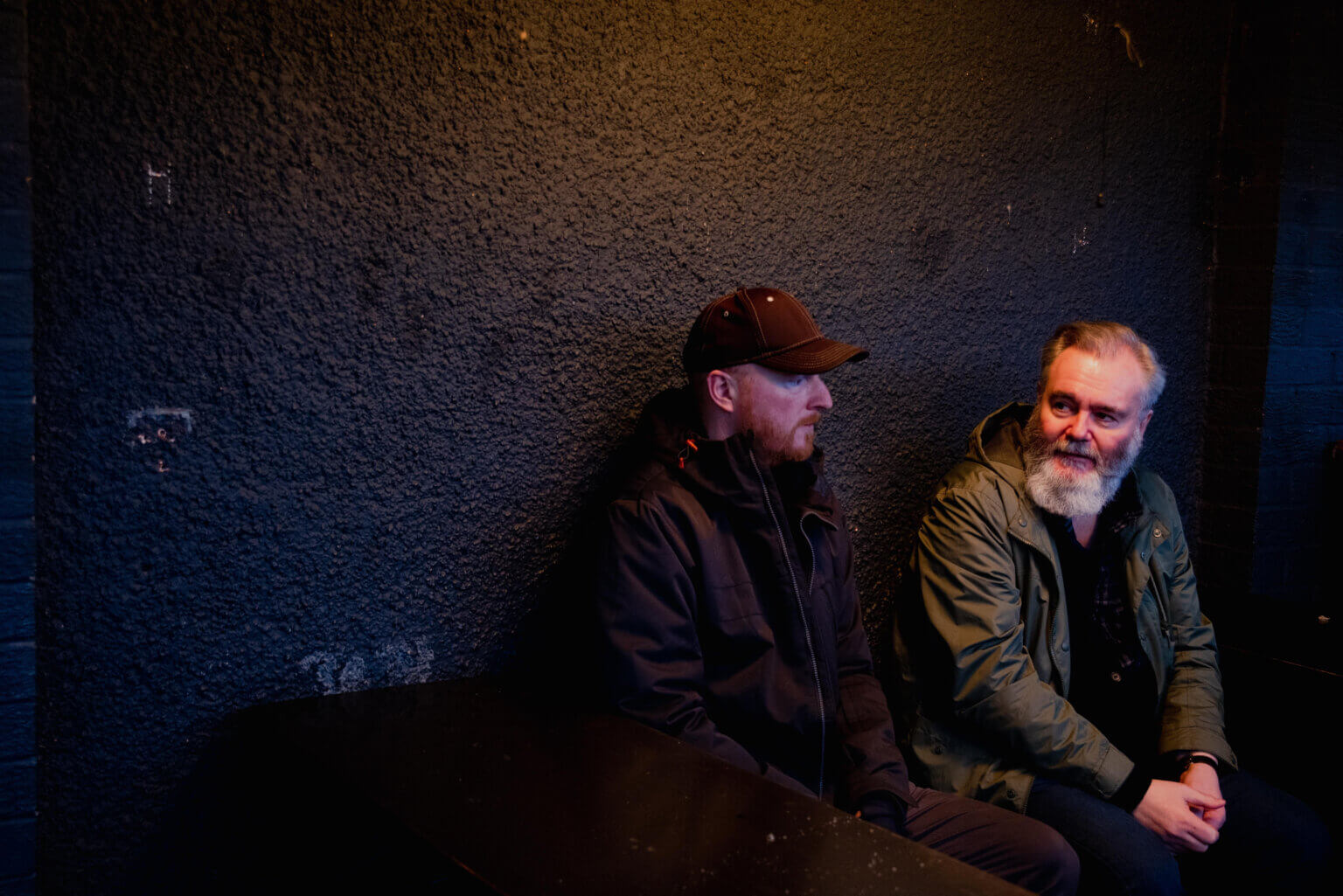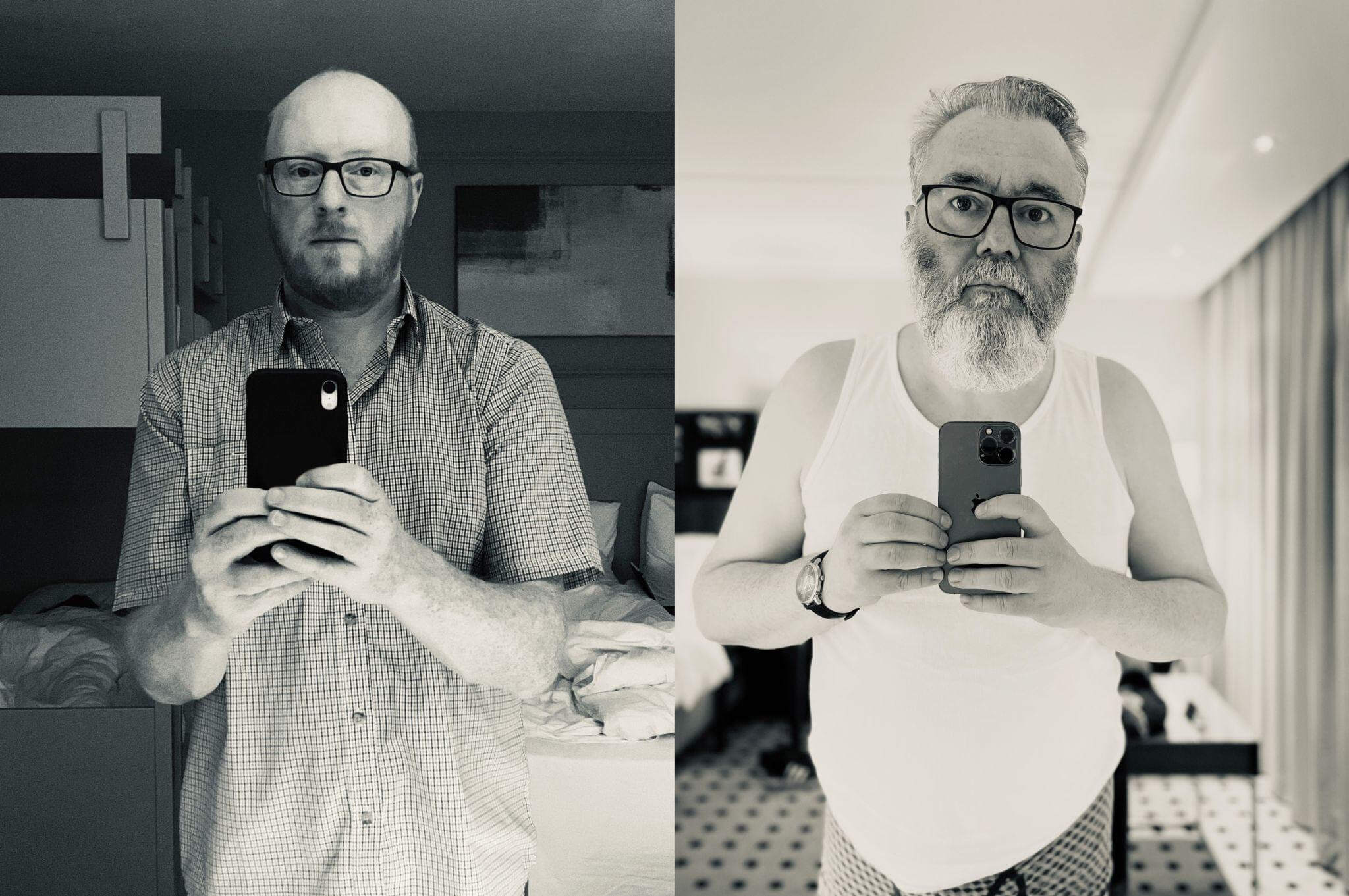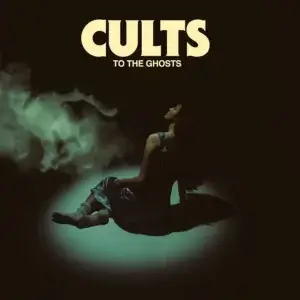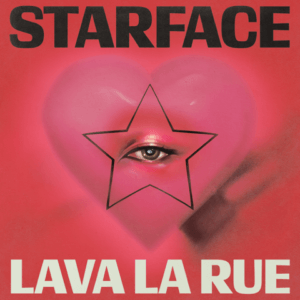Arab Strap deal with the reality of online living

Across their discography, Scottish duo Arab Strap have keenly written about their observations of the world around them. On their latest record, I’m Totally Fine With It, Don’t Give A Fuck Anymore, Moffat shifts his focus to examine the world as it’s presented in front of him via the glare of a a phone screen. Social Media and the ways it altered communication skills and perceptions of reality are astutely explored across these immensely intimate and engrossing twelve tracks which hear their arrangements expand to include even more brilliantly dynamic electronic motifs, presenting their most developed compositions to date. It’s a record that captures the moment we’re in with no filter. Its endearing earnestness and vulnerability makes for an exceptionally resonating and thought-provoking body of work.
Ahead of the release of their excellent forthcoming record, Aidan Moffat and Malcolm Middleton spoke to Northern Transmissions, aptly over Zoom, about the inspirations behind I’m Totally Fine With It, Don’t Give A Fuck Anymore, teenage dreams of ghost-hunting and the role of social media and their relationship with it as Arab Strap come closer to their thirtieth anniversary.
NT: I’ve been really enjoying listening to your new record, I’m Totally Fine With It, Don’t Give A Fuck Anymore. There’s a great expansiveness and intimacy all at once across the arrangements. Musically, it sounds like it must have been a lot of fun to develop.
Aidan Moffat: The fun part is the writing of it. The fun part is exchanging ideas and getting excited about what we’re writing. By the time we get to the studio, we’re a bit tired and it’s more of a formality than anything. But definitely, the way we make it, we bounce ideas off each other online and we’ve got a shared Dropbox thing where we put our ideas and so on. That’s the fun part, definitely, the writing and the making of it.
Malcolm Middleton: Yeah, creating is good, but the other fun part is the other side of it, which is what we’re doing now; getting a band ready to play the songs and stuff. Having people hear it, so that’s exciting too. We’re all about having a bit of fun these days!
NT: How is that going, getting the songs ready for the live show?
MM: It’s going really well. We’ve had about three or four rehearsals and we’re working with the same guys that worked with us for the last album. We’ve worked with these guys for years, so it’s good just getting everything in shape and making it a bit more dynamic and making sure the good bits are loud and looking at the intimate bits and just generally making it a good set and hope that people have fun.
AM: I struggle remembering words as I get older! All the old songs, like any old song we’re putting in the set or when we did the Philophobia tour last year, I know it’s totally in there, somewhere. I just need to access it. But these days, on stage, I know that there’s a couple of songs I’m going to have to write some notes on my hand! Some of it’s quite complex, but I will get there. I’ve another three weeks to go, so we’ll be fine.
NT: You can have a notebook with all of the lyrics in it to read from, add a bit of theater to the performance!
AM: I sometimes actually have them in front of me on a music stand. I don’t like doing it, but I mean, I’ve seen Nick Cave do that. So, I guess, why not? If he can get away with it then why not?
NT: Absolutely! You spent a significant period away from Arab Strap in terms of making new music together. Within that period, 2005 and 2021, so much happened in the world – politically and socially. Did you miss having the band and each other to write and create songs that examined, or tried to make sense or a commentary of what was going on before coming back together for As Days Get Dark?
MM: I think we were both too busy, to be honest! We did lots of solo stuff and collaborations between 2006 and when we got back together in 2016. It was nice when we got back together to have that again, but I don’t know if we missed it because we saw each other quite a lot during the years in- between. And like I said, we’re busy doing other things, but it’s nice to have it back.
AM: Yeah, I think that’s it, we kept working. There’s a lot going on in the world, you know, but specifically in music, like every year since the start of the century, there seems to be more and more obstacles for musicians to get over. That was kind of difficult. From my point of view, I kept writing as I would normally. I don’t think I’d be writing about the things with Arab Strap that I am now had I not kept writing in those 10 years of working with music, you know. It seems to me like it’s just a way I’ve progressed personally, as well, with a lot of the stuff that I’m writing about now. I never really felt like I wanted to address those sorts of things until this point. But I suppose that’s the general state of the world. You can’t really avoid it these days, can you?
NT: Yeah, unfortunately not. The record is very much rooted in online culture and habits. “Molehills” establishes a sense of detachment from self – “These are not my hands” / “These are not my words” / “These are not my friends, this is not my family / I play along to please” – it’s interesting the different ways we can interpret those lines, especially with online culture. Once can become detached from their reality and isolate themselves. Or, there’s also a sort of catfishing feel to it, someone stealing another person’s identity. It’s an interesting duality and one that just heightens the lack of reality that exists online. Was that something that was present in your mind as you were writing?
AM: I think so. What I’d come to realize after the pandemic was that I was focusing too much online. You know, and I think everyone does, you know, that was the only way we could communicate back then, but I don’t think I had recovered from that. I hadn’t seen any real friends for a while. I wasn’t really connected in a physical way and still I don’t really go out that much. I’ve been making efforts recently, I’m glad to say and have been having a good time. I suppose that’s the sort of realization that you come to at some point, like there is a very strange duality and I think people focus far too much on the online life. And it’s a lie, too. I mean, no one tells the truth online. Everything you put online has been thought about, there’s nothing natural about it. So, yeah, there is a duality and we’re all creating images of ourselves in this world. And we’re not really that sort of person. No one’s really, truly honest online and I find that fascinating.
NT: The band has an online presence and with that, fans have more accessibility to you and can reach out and interact with you. Perhaps share ways that your music has affected them.
MM: Yeah, I don’t do that, too much. I mean, we’re definitely there and visible and people can chat to us.
AM: I do. Yeah, I mean, that’s one of the good things. I try not to use X, as it’s now called these days, but because we have an album out, I don’t have much of a choice! It’s such a big part of the promo campaign these days. I do get people always saying nice things, occasionally some bad things, but nothing particularly nasty or anything. I was looking at YouTube yesterday, actually just to check our last video and all the comments were really, really nice. And I was like, ‘Ah, this is amazing!’. I got a nice wee ego boost reading it. Then I got to the bottom one which was like, ‘I don’t really like this song, but I might give the album a try’. And I was like, ‘Ah, there you go!’. And it’s funny, there’s like 200 comments there, but the only one I remember is the negative one at the bottom. But, no, it is still great to hear from people and be able to talk directly to people who buy our records and come to our gigs.
NT: Yeah, it’s like an extension of the merch table.
AM: Yes, it is! I try to avoid that these days too, but sometimes needs must.
MM: It’s like when you do a gig, you play 90 minutes, folk are clapping and enjoying it and all you remember and think about afterwards is the one mistake you made!
NT: We talked a bit earlier about communication, songs like “Summer Season”, with its mentions of emails and phone calls and, I also think of the opening line of “Turn Off The Light”, you say ‘I forgot how to be me”. Coming out of the lockdown period, a lot of people found it really difficult to interact and communicate with people in person. How was it for you to get back to socializing?
AM: I guess, like I was saying earlier, just said earlier, I just seemed to…I mean, it’s like my children, I’ve got a teenage boy and a 10-year-old girl and they don’t seem to understand what a phone is for. My daughter, especially at 10, she’s great at sending texts and even Facetime, but when you hand her a phone to try and talk to someone, she clams up. That’s kind of how I felt, too. It was so much easier to talk to people at one step removed. It did have a profound effect, I suppose. “Summer Season” is the song where I started to realize what I was writing about and why I was writing about these things. How I had found myself in this corner on my own; happily keeping in touch with everyone, but not really spending time with anyone, not really engaging with anyone in any meaningful sense. It was not just the pandemic, I think age is part of that, too. There’s a lot of things that all sort of converged at once and then put me in that position.
MM: It’s a funny one, I probably entered lockdown about five years before everyone else! I moved to a small fishing village on the East Coast of Scotland. I was kind of prepared for it. But, it’s weird, that thing to do with social media, especially Facebook, where even if you’ve seen what other people are doing all the time but you don’t necessarily engage with it, you can feel like you’re still in contact with them. After a few years of being like wait a minute, I’ve not actually physically spoken to that person for three years but I feel like I have because I’m seeing them all the time. That’s another weird side of the whole social media thing where you realize you’re not actually in touch with folk. You’re just seeing a 2D image of them or something.
NT: Something I’ve noticed more on social media, and it’s a common thing when people are going on a vacation to ask for recommendations, is people seeking advice on very specific personal situations. How to approach a very personal situation or engage with someone. It’s fascinating to see people looking for the advice and opinions of complete strangers online.
AM: Yeah, I would never ask the internet for advice! It’s not good. I should say though, as well, the song you mentioned “Turn Off The Light” is specifically about a magazine called Light, which is a conspiracy magazine, and it’s about people who were sort of dragged into that during that period and how it was such a fertile time for people. That idea of where people were lost, like we were saying, I forgot how to be me and forgot to function. They’re taking advantage of fragile states and that’s a big worry. Of course, I understand why these sorts of things and that culture can be appealing because we’re all just looking for friends, I suppose, but sometimes we might be looking in the wrong places.
NT: Listening to the record, and intently listening to your lyrics, I noted a recurring image of ghosts in the songs. They’re mentioned in “Bliss” or “Strawberry Moon” and also I think of “You’re Not There” where you’re trying to interact with a ghost-like figure. I’d love to hear about that aspect of the album and how it became such a unifying thread in your writing on this occasion.
AM: That’s kind of snuck into me recently. When I was young, I wanted to be a ghost hunter. That was my first job. I had a book, my favorite book, The Hamlyn Book of Ghosts, which had a bit about Harry Price, who was a ghost hunter. It had a list of all his equipment and I had a wee bag, a wee kit with equipment and stuff like that. As I’ve gotten older, I don’t believe any of it, I’ve hoped and longed to see a ghost all my life, but I’ve come to the fairly sensible conclusion that most of these things exist within the human mind.

Photo by Arab Strap
I’m still fascinated to hear ghost stories, I listen to that Uncanny podcast on the BBC, which is brilliant. I went to see it live, as well. Someone said to me, a friend who was at the show, it was actually Stuart Brathwaite from Mogwai, he was there. He was with someone and they said to me, ‘I don’t understand why you’d come to something like this if you don’t believe in it’. And I was like, ‘Well, because the stories are great!’. It’s fascinating, you know.
That’s sort of crept back into me recently. That whole idea of ghosts is probably, again, connected to the pandemic. These ideas always creep back into culture after there’s been some big event, you know, like after the wars and stuff like that. There’s maybe a sort of nostalgic element to me, it’s a way of connecting to my youth because it is something I felt so passionate about when I was young. I realized after we made the record that it had crept into it, a lot, as you say, there’s quite a few mentions of ghosts. “You’re Not There”, specifically, it’s about using your phone as a sort of Ouija board, which is apparently a big part of grief these days. I was reading about a lot of people who report that the way that they cope with loss is to just continue as if that person were alive and send them messages. Which is beautiful, I think that’s amazing. Of course, as well, with ghosts and what you’re talking about with having an online presence, you know, you are there, but you’re not really there. You’re not physically present. It all connects to that, too.
NT: It must be fascinating to see the way life and work as a band has changed so much from when you started Arab Strap in the mid-90s. Social media just wasn’t a thing whereas now it’s become such a prevalent part of the music industry, for example, with songs going viral on TikTok. How is it for you both existing with this element as a band where things were so different when you began?
AM: Do you know what, some of it’s great. I don’t understand how bands used to find venues before we had smartphones! There’s all this stuff that’s amazing. I think social media is probably a bit too poisonous. Again, though, it has its advantages. We’re of an age where 30 years ago, none of this existed and we’ve watched the world completely change. I mentioned my children earlier and they don’t understand the world without this stuff. That’s something I’ll never be able to relate to because perhaps for older people like us, it might be easier for us to remove ourselves from that. To know that there’s an alternative way to live your life, I think. I do worry that perhaps this is a bit of a modern addiction for younger people.
MM: It’s a funny one because we basically started off with having a label that used to send physical newsletters to people’s home addresses. Also, we’d have an A to Z map of Britain when we were playing shows and driving into town, usually heading for the worst part of it because that’s usually where the venue would be, and ask the first person who would point to the venue. That was old school! Then, we had a website, a fan used to do our website and all of that stuff. I’ve tried to embrace things like the newsletters and go on X and Facebook. But I think there came a point where it all got too fast and I’m like, ‘I don’t know how to work this anymore’. Facebook’s like a marketplace now. It’s also got too many tabs, I don’t know what to do!
We’re lucky that we’ve got a label who can handle all of that. We can engage with X and Instagram a bit. But I think if we didn’t have that, I’d personally be a bit lost because I could learn to do it properly. But it’s almost like I don’t want to because it’s an unseeable audience and ghosts. It’s a weird one, but I’m sure younger musicians coming through have got the good and the bad. It’s harder for young bands to come through and make a living out of this. Then if they’re brought up being a bit more tech savvy, they know exactly how to promote themselves. Which isn’t really part of the creative side of making music and being an artist. You have to be both unless you’re Taylor Swift, and you’ve got teams of people doing it all for you. It’s something I’m still not quite comfortable with; doing all the internet stuff.
NT: We mentioned YouTube earlier, I very much enjoyed the music video for “Strawberry Moon” How was it making that?
AM: It was pretty cold!
MM: It was bizarre. On the first day, I think it took two hours to get my werewolf’s hands on, even before getting my face done! When I turned up at a pub in Glasgow and went down to the basement and was greeted with strobe lights, dry ice, a hen party dancing and Aidan then knocking in the doorway. It was really cool.
AM: It was a much bigger production than I expected. When I got there, the first thing I did was send Malcolm a text saying that there’s an awful lot of people here! I thought it was just going to be the two of us, I didn’t realize that I’d have to flirt with a nun, although we cut that out, I just look at her in disgust now in the video. There was a wee bit that we cut out where I had a wee flirty moment with her. It was
lots of fun to make. The stuff outside, though, was especially cold. It was bitterly cold. It was great. I love it. I’ve know Dave [Arthur, director of “Strawberry Moon” music video] from years ago, he edited a film I made years ago called Where You’re Meant To Be, so I’ve known him for a while and know he’s a fan. I thought he’d do a very good job and he did, it’s brilliant.
NT: I wanted to ask about the song “Safe & Well”. It brings such a different mood, sonically. Can you tell me about the inspiration behind it?
AM: The words were inspired by a case of a woman who had died at the start of the pandemic. She may have died of COVID, no one’s really sure because when they found the body it was so decomposed they couldn’t do an autopsy. They don’t know why or anything about it. She’d been laying in her flat for, I think it was almost 14 months or something like that. It was horrible. She had virtually no online presence at all. There was one Facebook post, and quite sadly in that Facebook post she was trying to find an old friend as well.
It’s not specifically about her, there are lots of cases that are similar. I didn’t use all the details because it’s not really my story to tell, obviously. But I wanted to write something about that from the perspective of someone who had been lost. It’s like what we were saying earlier about the sort of lie of the online world and that everyone’s connected. There are many people out there who aren’t connected at all and people who simply disappear. It’s still remarkably easy just to disappear. Everyone is not always available in the way that we think they are.
The awful thing about it, as well, is that nobody really did anything about it. The neighbors were all concerned and they kept asking for help. The police visited, as I mention in the song, but they didn’t get an answer. In not getting an answer, they just walked away. There’s quite a lot of lack of humanity involved in that case, I’m sad to say. I hope that’s not too indicative of a culture today.
Pre-order I’m Totally Fine With It And Don’t Give A Fuck Anymore by Arab Strap HERE
Latest Reviews
Tracks
Related
Sorry, we couldn't find any posts. Please try a different search.
Advertisement
Looking for something new to listen to?
Sign up to our all-new newsletter for top-notch reviews, news, videos and playlists.




